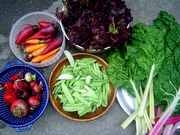

|
| Vegetable Varieties for Gardeners is a citizen science program
|
|
|
|
'Extra Summer Sweet' Melons |
| |
| Sub-Category: |
Other
|
| |
|
| Sub-Category 2: |
| | Description: |
Hybrid Asian melon from Japan. Disease-resistant vines bear nearly smooth, round, 1 1/2- to 2-pound, green-skinned fruit with green shoulder stripes and salmon-orange flesh.
|
| Days To Maturity: |
NA
|
| Seed Sources: |
|
| |
| Rating Summary |
| |
Overall: (5.0 Stars)
Taste: (5.0 Stars)
Yield: (4.0 Stars)
Ease/Reliability: (5.0 Stars) |
| |
| Reviews |
| |
Login to share your Review of Extra Summer Sweet.
Number of Reviews: 1
KEY: O=Overall Rating, T=Taste, Y=Yield, E=Ease
Reviewed on 01/16/2007 by
California Olive
- An experienced gardener
|
 Overall Overall
 Taste Taste
 Yield Yield
 Ease Ease
|
California, United States
Frost Free Season: More than 203 days
Soil Texture: Clay
Garden Size: Large - More than 1,600 square feet (40' x 40')
Sun Exposure: More than 8 hours per day
|
| This is a beautiful, unusual small melon bred in Japan. It appears to have complex parentage, and the flavor reminds me of the wonderful Crenshaw and Charentais types. It is probably my second-favorite melon, after Early Sugarshaw Hybrid Crenshaw.
The appearance of the melon varied somewhat, but, when ripe, was always a creamy color with cool, pale green markings radiating from the stem and blossom ends. It reminded me of the coloration of some of the Charentais melons. I am not sure if variations in the appearance reflected growing conditions or a little variability in one of the parent lines for the hybrid. The rind is smooth like that of a Charentais, though there is sometimes a little fine netting radiating from the blossom end. My melons were usually larger than the 1.5 - 2 pounds listed. This melon would be a good one to try if you have trouble growing Charentais melons because of splitting, or if you have trouble telling when a Charentais is ripe. This melon is more forgiving than Charentais of accidental watering near maturity, and it will slip from the vine when ripe. Its texture is not as fine or firm as that of a Charentais, but it has plenty of flavor and sweetness in our hot, dry climate. It is also easier to grow than the Crenshaw types, as it is smaller and does not require the same sunburn protection or as much care to prevent rotting from contact with moist soil (don't push your luck - this melon is no tough-skinned netted muskmelon). The flavor was quite similar to the best Crenshaw melons, with slightly looser, more juicy texture. Melon quality was maintained after the first flush of melons were harvested. |
| | | 1 of 1 gardener found this review helpful.
|
|
|
|
|
Vegetable Varieties for Gardeners is a citizen science program, © 2004-2024, All Rights Reserved
Cornell Garden Based Learning, Cornell University College of Agriculture & Life Sciences, Horticulture Section
|






 VVfG home
VVfG home

